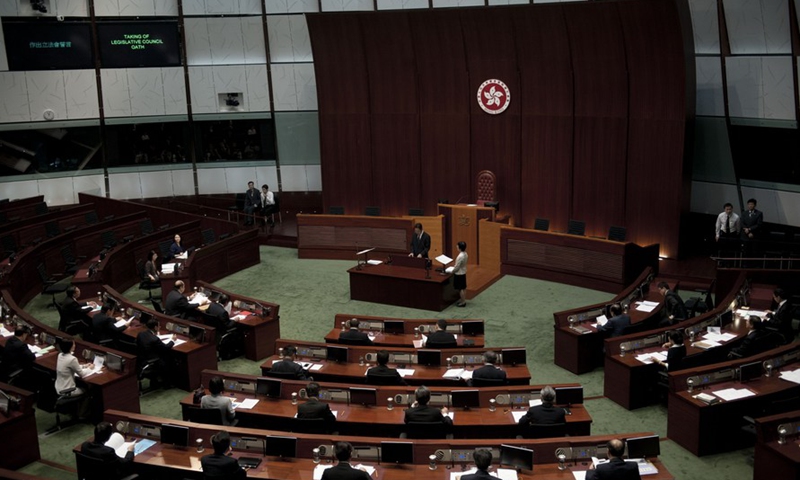Disqualified HK lawmaker candidates ‘questionable’ to reenter legislature
By Cao Siqi, Chen Qingqing and Bai Yunyi Source: Global Times Published: 2020/8/5 21:28:40

LegCo File photo:Xinhua
China's top lawmakers are expected to soon make a legitimate and reasonable arrangement in accordance with the Constitution over the outgoing Legislative Council (LegCo) of the Hong Kong Special Administrative Region (HKSAR) to avoid a potential "vacuum period" resulting from the postponed LegCo election.The National People's Congress (NPC) Standing Committee will hold a meeting from Saturday to next Tuesday.
Issues that need to be determined concerning Hong Kong include whether LegCo candidates who have been disqualified from the election should be allowed to return to the council, and if it is necessary to establish a provisional LegCo to avoid a vacuum period.
Many legislators and experts suggested that disqualified legislators should be barred from the LegCo. Supporting the Basic Law and being loyal to the HKSAR government is the bottom line, and legislators believe that the NPC Standing Committee will finally make a legal and reasonable solution.
For the vacuum period, some suggested extending the term of the current LegCo for one year while some proposed a caretaker council. Authorized by the central government, the caretaker council could consist of members appointed by the HKSAR government. Based on the current members, the council could add or reduce the number of members.
Zhang Xiaoming, deputy director of the State Council's Hong Kong and Macao Affairs Office, reportedly met several legislators in Hong Kong on Monday and Tuesday at the Central Government Liaison Office and heard their opinions about the council issues.
Junius Ho Kwan-yiu, one of the legislators at the meeting, told the Global Times on Wednesday that he supports the Standing Committee of the NPC to make decisions on the postponement of the LegCo election, vacancies in the council and by-elections.
According to the Constitution and the Basic Law, such decisions have the highest effect in the Hong Kong legal system and are not subject to any challenge. This can prevent others from making unnecessary judicial reviews, Ho said.
Ho proposed extending the duration of the current term of the LegCo in Hong Kong as it has precedents. Many countries including the UK and the US had adopted the method of extending or renewing the original institutions to deal with the special circumstances of a postponed election.
However, he said four types of legislators - those disqualified for the next election, who had committed serious crimes, who colluded with overseas forces to subvert the country and who participated in secessionist protests - should be deprived from the extension.
Similar to Ho, Tam Yiu-chung, a member of the NPC Standing Committee, suggested the duration should be extended by one year.
"The NPC Standing Committee can announce the arrangement in a decision, not in an interpretation, because it will not change the policy that requires a four-year term for the LegCo," Tam told the Global Times on Wednesday.
However, as to whether the disqualified candidates could return to the council, Tam said it remains in dispute and they are awaiting the decision of the NPC Standing Committee. But he stressed that the decision will conform to the Constitution, the Basic Law and other provisions in Hong Kong.
"It will not be complex," Tam said, noting that the council issues are supposed to be discussed and resolved during the upcoming meeting to "reassure the public."
HKSAR Chief Executive Carrie Lam said earlier that in her personal opinion, the most pragmatic approach would be to extend the current term of LegCo for another year, Hong Kong newspaper Ming Pao reported on Saturday.
Tian Feilong, a legal expert on Hong Kong affairs at Beihang University in Beijing, also supports the extension, saying that in that way the overall operations of the LegCo can be maintained at the lowest cost.
Lau Siu-kai, vice president of the Chinese Association of Hong Kong and Macao Studies, suggested that it is more feasible to establish a provisional LegCo.
"The procedures are not complicated and can be done quickly. It only requires the NPC to make a decision and then authorize the provisional LegCo to exercise the powers of the legislature. The key is whether to transfer all or part of the current members to the provisional council," Lau told the Global Times.
The central government has made the bottom line very clear: Hong Kong should be governed by patriotic people. In this case, it is questionable if disqualified members become eligible to enter the provisional legislature, Lau said.
In the coming year, Hong Kong needs to deal with many crises, including economic, livelihood, and employment issues brought about by the epidemic, as well as various problems caused by the continuous pressure and sanctions imposed by the US.
The central government will definitely hope that the provisional LegCo can operate efficiently and cooperate with the HKSAR government, Lau said.
Analysts said the possibility that the opposition camp in Hong Kong would bring about a new round of speculation could not be ruled out. Some opposition legislators may refuse to enter the provisional LegCo or renew their terms to oppose the delayed election and continue to stymie the legislative work.
Newspaper headline: NPC to help LegCo avoid ‘vacuum period’
Posted in: HK/MACAO/TAIWAN